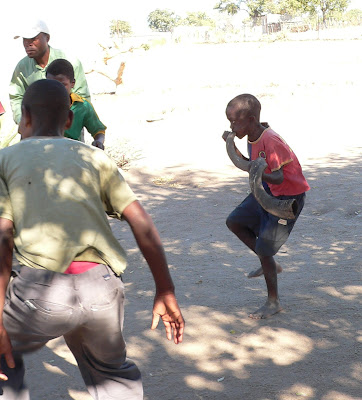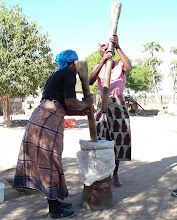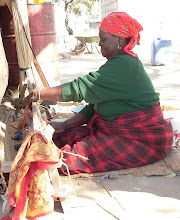One of the village youngsters toots a horn from a kudu as his friends do a traditional dance
Some of the village men work at lodges within Kruger Park, or for nonprofit organizations, and we found them very well informed about the changes and challenges the village faces. The households rely heavily on natural resources as a source of fuel, food, housing material, fencing, and so on. The residents talked with us very openly about their dwindling supplies of these resources, such as fuel wood, and about their frustrations with elephants that trample their crops, and lions that kill their livestock. They were refreshingly frank about their options in dealing with these issues. The visit had a profound effect on my understanding of world conservation – I can’t overstate the effect it had on me, and I’m not sure I can analyze it. But I do know that eight months ago, my sympathies, my hopes, my anxieties were exclusively focused on wildlife and the coming mass extinctions due to habitat loss and climate change. And still, those worries occupy my mind. But I see now that the issue is much more complex than just saving wildlife.
Successful wildlife conservation plans must give local people economic incentives to participate and support the plans. And more than that - local people want and are entitled to an active voice in mapping out conservation plans as well. If elephants trample their crops, they must be compensated. When villagers call park officials about lions or Cape buffalo in the village, someone should respond. Parks and wildlife preserves should offer training to local people for employment in wildlife tourism - in lodges or preserves or parks - which is happening, but needs to happen faster. When the billions of wildlife-tourism dollars flowing into Africa wind up in the hands of rural villagers near the parks, everyone will benefit: local families, animals, community stability, etc.
The issues involving resource use and conservation are complex and daunting all over the world, but perhaps especially in Africa – a place with more cultures, more languages, more animals than anywhere else on the planet. I am grateful to the villagers of Welverdiend and to the faculty and staff at WRF for giving us a huge leap in understanding these issues.
Cliford Mathebula (Welverdiend resident) at blackmc@webmail.co.za
Wayne Twine at rcrd@global.co.za to book a village tour
Keywords:: Africa cultural village Shangan community visit tour South Africa Wits Kruger National Park Witwatersrand elephants WRF welverdiend tour south africa village tour welverdiend village tour visit south african village visit village near Kruger National Park south african village life welverdiend village tours



















